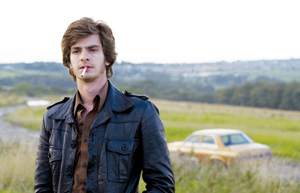

WILDLY AMBITIOUS and thoroughly brutal—I mean, Saw-level brutal—the Red Riding trilogy gets in there and hits spots that Shutter Island could only acknowledge by homage. The three films—Red Riding: 1974, Red Riding: 1980 and Red Riding: 1983 (each about 100 minutes long)—are by three directors working on Tony Grisoni’s massive adaptation of a series of crime novels by David Peace.
The engine of this epic British mystery is a serial killer, or killers, at large over the course of nine years: angel-makers, leaving behind violated corpses of little girls, with wings cut from dead swans stitched to their bare shoulder blades.
A jest in Red Riding: 1980 between a crusading police inspector and a priest sums up the threat. The usually mild-mannered Inspector Hunter (Paddy Considine) asks, “If someone kicks down your front door, kills the dog and rapes your wife, who you gonna call?” The priest (Peter Mullan) replies, “It certainly wouldn’t be the West Yorkshire Police. They’d be in there already, wouldn’t they?”
Red Riding‘s story of corruption and skullduggery centers around these dangerous cops: eager to immolate a Gypsy camp, torture a journalist or frame a handy moron. The moron is named Myshkin, a la Dostoevsky’s The Idiot; no, Red Riding ain’t subtle.
These movies may be hard on “the filth,” as British citizens sometimes call their constables, but the West Yorkshire cops were discredited during the murder spree of the Yorkshire Ripper. Those real-life killings are essential to Red Riding when the cops try to piggyback a murder onto the Ripper’s death toll of 13. Red Riding: 1980 mentions the true details. The West Yorkshire police had collected so much paper that they had to bring in contractors to reinforce the floor of an evidence room. Sometimes diligence and incompetence can go hand in hand; the convicted killer, Peter Sutcliffe, had been questioned nine times before he was finally arrested.
Local details may be stumbling blocks for American audiences. “Peter Sutcliffe,” asks the Yank viewer, “wasn’t he the guy John Lennon replaced in the Beatles?” The dialect is tough on the ear—low, muttered and glottal. Subtitles are just about needed during some of the most intense parts.
Red Riding: 1974 concerns the fate of a self-loathing journalist, Eddie Dunford (Andrew Garfield), who is out of his depth dealing with a vastly confident developer (Sean Bean, excellent) and a policeman named Craven (Sean Harris), who is still trying to figure what side of the law he’s going to be on.
Rebecca Hall plays Paula, the mother of a snatched child who begins as Dunford’s source and turns into his lover. Grief is such an aphrodisiac, but director Julian Jerrold stresses the awkward angles and hard labor of bodies in bed; we don’t get relief from the constant threat of violence through anything lyrical.
Red Riding: 1980 picks up the thread as a love story: a Graham Greene dilemma for the Catholic detective Hunter (Considine—in his first five minutes you can tell this is the best acting he’s ever done). Despite his marriage, he still has a thing for one of his employees. Duty is wearing him down; he has taken over the investigation of the child murders without much help from the officers under him. They’re not worried, since, as Craven says of the victims, “They’re slags.”
Lastly comes Red Riding: 1983, beginning with the flashback that allows us to see the men behind the curtain. Robert Sheehan plays a traumatized, half-sane male prostitute called BJ, who has the key to the problem—a key he never relinquishes for fear of his life.
You get lost, but the faces carry you through it: Cara Seymour is touching as a wilting flower of a woman. Harris’ slicked-back, liver-colored hair is a sight to affect the gorge. Bill “The Badger” Molloy leads the cowboys of the force, meaty bad bastards all; he is played by Warren Clarke, who once upon a time was the treacherous droog Dim in A Clockwork Orange. Age has given him the truculent snarl one might imagine on a “Big Brother Is Watching You” poster. Opposing all these bulls is plump lawyer John Piggott (Mark Addy), the show’s most trustworthy yet fallible character: “I’m disgusting, but my heart is pure.”
Produced for England’s Channel 4, Red Riding makes a strong argument for the primacy of adult television. Judging by this and shows like Mad Men, we can probably agree that there is something about the serial narrative that leads to more deep involvement than screenwriter Syd Field’s traditional three acts.
The on-the-cheap atmospherics are compelling: a plastic-wood-paneled basement pub named for Shakespeare; an ever-decaying coal town shadowed by a half-dozen mammoth cooling towers. Through exposure to brown light, stasis and despair, the people in Red Riding are devolving into brick walls.
Reportedly, these three individual films work on their own, but I don’t recommend that experience. The way they fit together is essential to the trilogy’s power and scope. It is worth it to schedule a marathon viewing.
A compelling murder story ought to be about a crime worse than murder. Just as Philip Marlowe was always in vain pursuit of the real culprit—the villains who made the monster city of Los Angeles—the villains here are the powers that be in Yorkshire. Red Riding is not about the 20 or 30 lives taken; it’s about the thousands of lives ruined. The trilogy’s most quotable line expresses the misrule of the area: “This is the North, where we do what we want.”
Local theaters, show times and tickets at MovieTimes.com.
THE RED RIDING TRILOGY (Unrated), directed by Julian Jarrold, James Marsh and Anand Tucker, written by Tony Grisoni, based on a novel by David Peace, and starring Warren Clarke, Sean Harris, Paddy Considine and Paddy Seymour, opens March 5 at Camera 3 in San Jose.



